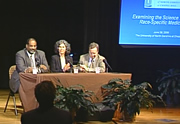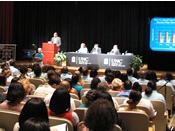|
What Will Health Care Reform Mean for
Minority Health Disparities?
Mayra Alvarez, M.H.A.
[bio]
Health Reform and Communities of Color: Working Toward the Elimination
of Healthcare Disparities
Abstract:
Racial and ethnic minorities represent only one-third of the total U.S. population, but they make up more than 50 percent of the nation's uninsured. People of color experience worse access to health care and worse health outcomes when compared to the general population. The new healthcare reform law (The Affordable Care Act) includes a number of important provisions that will either directly or indirectly improve the health of communities of color and reduce health disparities affecting racial and ethnic minorities.
This presentation will explore the main components of the new law, which will expand coverage and improve access to care, and will also discuss specific provisions that may have a specific impact on reducing health disparities for communities of color. These provisions include greater access to health coverage through Medicaid expansions and health insurance exchanges, workforce development, community based programs, and community health centers, among others.
The presentation will review the legislative process, the importance of advocacy by minority health representatives, and what advocates can do moving forward to work effectively with the federal government to ensure that implementation of the new law will have the greatest positive impact on the health of communities of color.
Ralph Forquera, M.P.H.
[bio]
Health Disparities and Indian Health: Will the New Health Reform Bill Make a Difference?
[slides]
Abstract:
American Indians and Alaska Natives experience well-documented health disparities. In almost every social metric, Indians are identified as being overrepresented in those factors that negatively affect health, including poverty, inadequate education, unemployment, homelessness, etc. These factors manifest as higher rates of chronic diseases such as diabetes and heart disease but also behavioral problems like alcoholism and violence. Behind the proximate causes of health disparities within Indian Country lie historical and political factors that may have a greater influence on the success of health improvement efforts than removing the financial barriers that have driven the reform debate.
Health insurance reform, though a valuable first step for the nation, is likely to have limited effect on reversing the disparities experienced by Indian populations - both reservation and urban - in the near term. The assumption that health and health care are synonymous overlooks the complex conditions - tangible and intangible - that contribute to the disparities statistics. How much improvement in one piece of the equation can change the overall balance, particularly in a world where past contributing factors like racism and economic disparity have re-ignited in the nation, is an open question.
This presentation will provide an overview of the historical and political context that underlies the Indian health "system" and how reforms in our health insurance system alone are unlikely to overcome the harm caused by the many underlying factors that contribute to health disparities for Indian communities.
Tony Whitehead, Ph.D., M.S.Hyg.
What does Health Care Reform mean for "Racialized Urban Ghettoes?": A Role for Community Based Participatory Research
[slides]
Abstract:
I am honored to be invited to speak at this conference because the foundation of this talk is the lessons I learned during 11-1/2 years here on the faculty of the UNC Department of Health Behavior and Health Education. After leaving UNC in 1987 and spending a year in France, I took up my new position as Chair of the Department of Anthropology at the University of Maryland, College Park. A year after my arrival in the DC area (1989), I began ethnographic studies of community health and social issues in predominantly African American (more than 90%), economically depressed, and underserved communities in the Baltimore-Washington Corridor. I began to refer to these communities, and those of similar demographic and social characteristics around the country, as "racialized urban ghettoes" (or RUGs).
Rationale for this designation as RUGs is found not only in their predominantly African American populations, but also because of the role that race, racism, and related conditions of persistent poverty, educational deficiencies, lack of access to health care, ecological deterioration, high crime and incarceration rates, etc., have played in the creation and persistence of RUGs. More disturbing is that from my arrival in the DC area until the present, conditions in these communities worsened as the primary policy response to them has been the mass incarceration of their young, who upon release return to these communities with more health and social deficits than when they were imprisoned. These trends worsened further over the last 10 years, as the country's politics placed even less importance on these needs of these communities, and shifted national resources to fighting wars in foreign lands.
In the present paper, I will explore my reflections on what impact I think Health Care Reform will have on RUG populations and the role that universities, in particular schools of public health and similar professions such as social work, and community health nursing, psychology, and anthropology, might play in addressing some of the needs of these communities. Support for the paper's primary argument will come from CuSAG's most recently established University to Community Health Outreach Network (UC-HON), in particular the UC-HON's community based participatory research (CBPR) approach that integrates research, training, and technical assistance.
Back to the top
Minority Health Project|
Department of Epidemiology
UNC Gillings School of Global Public Health
2104D McGavran-Greenberg, CB#7435 | Chapel Hill, NC 27599-7435
Phone 919-966-7436 | Fax 919-966-2089| E-mail Minority_Health@unc.edu
Last
updated: 4/30/2010, 5/19,26/2010, 6/8/2010 by Vic
|





